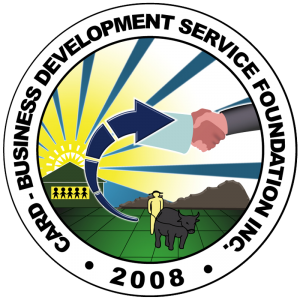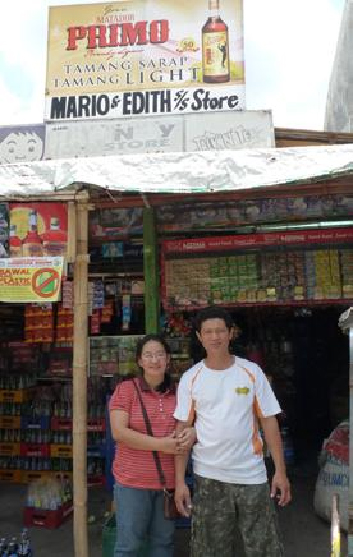Editha Miranda
From ash to cash
It was February 6, 2001, a day after the town fiesta. Several days before, Editha Miranda’s sari-sari store was packed with customers buying food and food ingredients, drinks and other goodies for the festivities. The store earnings in the past days were exceptionally high because of the occasion. Butthe festive day ended in a night of disaster for Editha because of the fire that turned their house, and all of their store assets including P300,000 cash into ashes. “We’re back to zero”, was all Editha and her husband could utter.
Editha, a secretarial graduate and her husband Mario, an educator, started their sari-sari store business in 1988 with two sacks of charcoal and various grocery items. Their initial capitalization was P7,000, the cash gift that they received on their wedding day. After a while, they ventured into wholesaling soft drinks and beer. The business grew slowly and their store’s inventory reached P500,000. This prompted Mario to resign from his job so that he can help his wife in the store. A nightly habit of the couple was to recap the day’s events which allowed them to also plan for the improvement of their business. The entrepreneur in Editha enabled her to think of innovative ways of running a sari-sari store. She realized that a sari-sari store is a type of business where the store owner just waits for the customers to come and buy his products. She did not want to be a passive store owner who depends solely on walk-in customers. She discussed her idea with her husband and they decided to introduce a mobile sari-sari store strategy which they called rolling store. They bought a motorcycle, fitted this with a side car which can contain around P20,000 – P30,000 worth of groceries. Mario started peddling grocery items to smaller sari-sari stores in their town. For 13 years, the couple nurtured their business. Then that fateful day came when fire ate everything they had.
The couple was devastated and joy turned to gloom. All of a sudden, everything they worked so hard for were gone. Their nightly recap became a venue for expressing each other’s sadness and despair. Despite their misery, they still squeezed in time to plan on how to move on. Slowly they began to pick up the pieces and decided to start over again. Picking up the pieces also meant sifting through the remnants of the fire and gathering the charcoal which they could still sell. This particular item was one of their fast-moving goods.
On September 5, 2002, Editha became a CARD member. Membership, she thought would help her start her business again. Initially, she applied for a P4,000-loan which she used to stock-up her new sari-sari store. On July 4, 2008, she became a member of BDS, and was one of the pioneers of the Hapinoy Program. Hapinoy aimed to provide sari-sari store owners financial, promotion, business opportunity identification and training support. Editha attended a Hapinoy training and shortly after that, she was awarded a loan worth P100,000 which she used to build an inventory of grocery items for her sari-sari store. Hapinoy has partnerships with at least seven companies namely Unilever, Procter and Gamble, Colgate-Palmolive, Century, Nestle, Marca Piña and OishiLiwayway Marketing Corporation. BDS-Hapinoy helped Mario and Editha get back on track. The goods provided by Hapinoy to the couple can be paid for after 30 days. Other consumer goods agents do not offer a one-month credit term.
The couple’s business currently employs three regular employees and two extras are hired during peak days. Mario delivers grocery items to around 200 stores, 50 of which are in wholesale and 150 in retail operations. Many of these clients are also CARD members. Mario and Editha were able to acquire a 2nd motorcycle and sidecar for their rolling store. The couple built up their rolling store operation because they get a 10% margin from such as compared to the 5% margin from their instore operation.
Mobile phone has also become an important innovative selling tool for Editha. The couple used text messages to inform their current and potential clients of their schedule run in specific areas. Mario even dropped by stores owned by noncustomers to ask if the latter are interested in his wares. His clients saw the cost and time savings of ordering goods through text massages and having them delivered to them. To date, the couple has 117 customers which they serve through the short messaging system. Charcoal is still one of their best selling items. It is strategically placed next to the store’s entrance so customers can see them right away. The store also carries lambanog, another local product which is also a fast seller. Editha flavors the lambanog with raisins, jackfruit, orange and other fruits. The different flavors have attracted more buyers.
~ Editha Miranda

